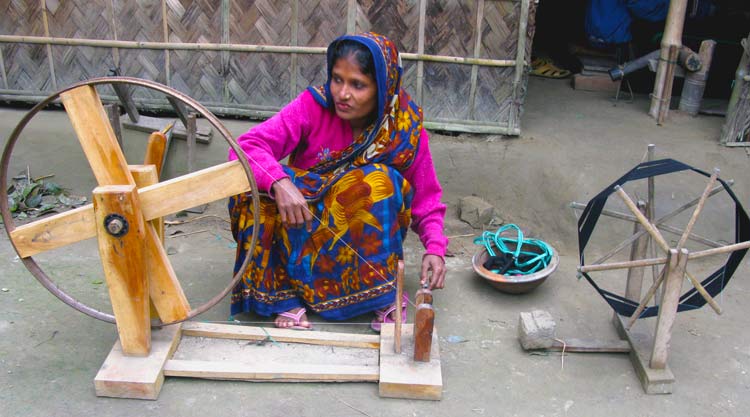Working with handloom weavers

The handloom industry in Bangladesh has enormous potentiality and the weavers are very skilled in their respective craft weaving. However, due to lack of support many of them were forced to change their occupation and leave weaving.
BeezBistar Foundation carried out a project called Rural Entrepreneur and Development in Handloom Weaving (Livelihood for home weavers families). The conceptual premise of this project lies in appreciating the significance and value of handloom and the urge to search for a rural development approach that can transform rural economy positively by linking the sector to the needs of domestic economy. The unique idea of the project is its entrepreneurial capacity building in the household as well as in the village level with efforts to empower the poor and disadvantaged section of the rural weavers. It also has to be environmentally sustainable without causing damage to the surroundings by use of chemicals and fossil fuel.
The activities included:
- input support among poor and skilled weavers
- support to women developing entrepreneurship
- marketing support to handloom weavers
- workshop and seminar for policy influence and networking
- technical support in terms of offering general and technical training for weavers
- education for children of weavers
- Integration of biodiversity based ecological agriculture with handloom weaving
The project support in Tangail empowered the weavers to buy yarn, dye and other raw materials from the open market at competitive price. This support gave them the strength to remain free from the exploitation of the big mahajons (the merchants), micro credit NGOs, money lenders and others. This support created a sense of unity among the weaving community. They had a burgain power for selling their products in the open market. They have informal union for collecting the raw material and selling their finished products in the local market as well as markets outside the locality.
Some tangible improvement of the program weavers took place in different forms. These were acquisition of new looms, improvement of economic condition, increase of production capacity, rebuilding loom house, repairing of old looms and released of leased land. The wage weaver turned into family entrepreneur by owning looms themselves including husband wife and children, while children were still going to school. The weavers were encouraged to enhance production capacity and to be knowledgeable about the market demand through BeezBistar Foundation and from Prabartana the sales outlet of UBINIG, a policy research organisation.
The weavers formerly indebted were able to free to repay from additional income. For their food security these weavers have been practicing ecological agriculture in their homestead area as well as in the field for production of cereals, vegetables, spice and fruits. In addition weavers saved some money and purchased goat and cows. These weavers have space in homestead area and somewhere in the field. In this case they collaborate with Nayakrishi farmers in their villages. They get feed for the goat and cow from the homestead area and the field.
Marketing support is one of the most important needs of the weavers. The big merchants control the market. In this situation the small weavers face problem to sell their products. The working capital support provided from the Beez Bistar Foundation offered them a significant strength to face the competition. Now they have bargaining capacity even in the competitive market with the big merchants. They cans sell their products independently in the open market. The weaving of Beez Bistar Foundation make provision for the weavers to sell their products in the Karatia hat at Tangail and also help them to participate in different festivals and events to sell their products.